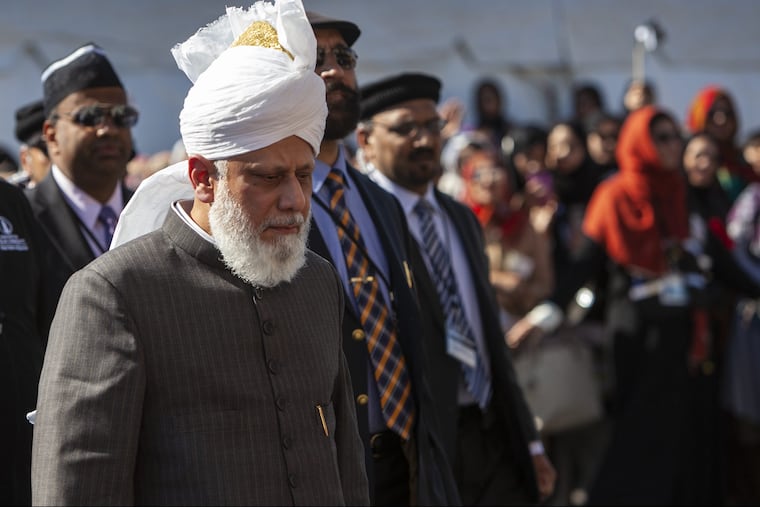The Ahmadiyya Muslim Community’s ‘pope’ visits to dedicate a mosque in North Philadelphia
Mirza Masroor Ahmad, international leader of the Ahmadiyya Muslim community will visit five cities during a three-week U.S. tour.

Nearly a century after the first Ahmadiyya Muslim missionary sailed across the Atlantic to Philadelphia, the sect's international leader is visiting the city to dedicate a new mosque in a struggling neighborhood.
Khalifa Mirza Masroor Ahmad, the equivalent of the pope to the world's 20 million Ahmadis, is spending three days at the Baitul Aafiyat mosque on Glenwood Avenue in North Philadelphia during a visit marked by a modest amount of pomp, but heavy security.
"The first missionary came to Philadelphia, so Philadelphia has a particular importance. And he has come to remind us of that history," said Imam Abdullah Dibba, of Baitul Aafiyat, which means "house of security" in Arabic.
Ahmad arrived in a caravan Wednesday from the group's national headquarters in Silver Spring, Md., to an excited crowd of about 1,200 followers. The group, some of whom had come from as far away as Canada, greeted their leader with a red carpet lined with families holding signs, and children singing songs of welcome. About 700 Ahmadis live in Southeastern Pennsylvania.
Ahmad began his U.S. visit Monday, traveling from London, the community's international headquarters. He is scheduled to make stops at Ahmadiyya communities in Baltimore, Houston, and Manassas, Va. Between Houston and Manassas, he will travel to Guatemala, where the Ahmadis are opening a new hospital. Ahmad will depart Nov. 5 to return to London.
>>READ MORE: Cherry Hill wants residents to know their Muslim neighbor
Ahmadiyya Muslims believe that the sect's founder, called Messiah Mirza Ghulam Ahmad, was a prophet from God, while most Muslims believe that the Prophet Muhammad, the founder of Islam, was the last prophet in a line that includes Adam, Moses, and Jesus Christ, said Muqtedar Khan, a professor and founding director of the Islamic studies department at the University of Delaware.
Mirza Ghulam Ahmad, an Indian mystic, announced he was the messiah in 1889. His purpose was to "revive Islam, reform Muslims, and unite mankind," Dibba said.
But Mirza Ghulam Ahmad is viewed as an apostate in some countries around the world, said Daniel C. Bottomley, an assistant professor at the University of Delaware who wrote his dissertation on the Ahmadiyya Muslim Community. Ahmadis are banned from calling themselves Muslims in Pakistan and members of the sect have been persecuted and killed because of their beliefs.
In 2010, Habib Peer, who immigrated to Philadelphia from Pakistan and became a U.S. citizen, returned to his home country and was shot dead in what his family said was a targeted killing because of his religion. Peer's death occurred three months after an attack on two Ahmadiyya mosques in Pakistan that killed 94 people.
Amid the violence, Ahmadis advocate for peace and interreligious dialogue. Mirza Masroor Ahmad, the tradition's fifth Khalifa, has made that a focus of his tenure, which began in 2003. He has launched a National Peace Symposium which is held annually in the United Kingdom, and an international Ahmadiyya Muslim Prize for the Advancement of Peace. Local mosques are instructed to initiate grassroots efforts in their communities. About 20,000 Ahmadis live in the United States.
>>READ MORE: Local Muslim sect introduces Islam with #MeetaMuslim effort
Born in Pakistan in 1950 when the country was the Ahmadi's international headquarters, Mirza Masroor Ahmad studied agricultural economics, earning a master's degree from the University of Faisalabad. He spent eight years in Ghana working on development projects, establishing farms and schools. He returned to Pakistan in the mid-1980s, and was eventually elected to lead the Ahmadis.
In North Philadelphia on Wednesday, Ahmad toured the new 21,000-square-foot mosque in the city where nearly a century earlier, missionary Mufti Muhammad Sadiq arrived to spread the faith. Sadiq then moved on to New York, Chicago and Detroit.
Philadelphia's small community worshiped in a 4,000-square-foot mosque on Ninth Street before moving into its new $7 million building, funded by members' donations and support from the national headquarters. Inside is a pristine house of prayer with cool gray/blue walls, a library, offices, and a multipurpose room where the local community will host on Friday a dinner in honor of Ahmad. During his visit, he will meet with individual families, lead prayers, and meet local dignitaries at the Friday event.
Jameela Ahmid, 75, of Logan, stood along the border of the red carpet Wednesday to get a glimpse of the man Ahmadis consider to be their pope and spiritual father.
Ahmad walked deliberately and quietly down the carpet, wearing a towering turban and surrounded by a phalanx of security. He stood next to the dedication plaque and unveiled it without a word.
"This is one of the highlights of my life to [see] the Khalifa, worldwide who is in charge of millions," said Ahmid, a retired coordinator of after-school programs. "I am here because I believe in the messiah. I believe in love for all and hatred of none."